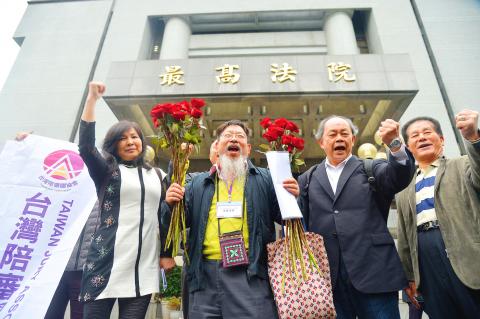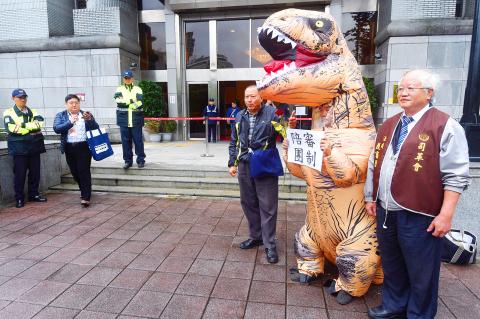Taiwan Jury Association chairman Chang Ching (張靜) yesterday presented officials at the fourth subcommittee meeting of the national conference on judicial reform at the Supreme Court in Taipei with red roses before a discussion on how to implement a jury system.
Chang, a former judge who quit but continued to practice law as an attorney, wanted to draw attention to his case, enabling effective participation and input by citizens in the judicial process through a jury system.
His move was apparently mocking Judicial Yuan President Hsu Zhong-li (許宗力), who has led conservative forces within the judiciary to oppose a jury system, saying: “Pushing for a jury system in Taiwan is like trying to grow roses in the desert.”

Photo: CNA
“What Hsu does not know is that there are actually species of roses that can grow in the desert,” Chang said at the meeting in the afternoon.
“In the years to come, no matter if we get a jury system or a more limited way for citizens to participate in the judicial process, there will be major changes and effects. For any of these options, there are positive and negative aspects, including for the current system of court rulings by professional judges,” he said.
“What we do know is that the current system has resulted in 80 percent of the public not trusting our judicial system,” Chang said.

Photo: George Tsorng
He handed a rose to each subcommittee member, including judges, saying: “We hope the red rose can symbolize a sacred flower that can break the curse on the judicial system.”
“The jury system can help to preserve the impartiality of the courts. It can separate the distinct duties of jurors and judges,” Judicial Reform Foundation executive director Kao Jung-chih (高榮志) said.
“That way, judges would not be encumbered in criminal cases. The public could also effectively participate in the judicial process, allowing them to better relate to it,” Kao added.
Former grand justice Hsu Yu-hsiu (許玉秀) cited the results of a survey, which showed that many people have difficulty comprehending court rulings.
She and other members recommended that rulings by judges and judicial documents be written in plain language to make it easier for average citizens to better understand them.

DEFENSE: The National Security Bureau promised to expand communication and intelligence cooperation with global partners and enhance its strategic analytical skills China has not only increased military exercises and “gray zone” tactics against Taiwan this year, but also continues to recruit military personnel for espionage, the National Security Bureau (NSB) said yesterday in a report to the Legislative Yuan. The bureau submitted the report ahead of NSB Director-General Tsai Ming-yen’s (蔡明彥) appearance before the Foreign and National Defense Committee today. Last year, the Chinese People’s Liberation Army (PLA) conducted “Joint Sword-2024A and B” military exercises targeting Taiwan and carried out 40 combat readiness patrols, the bureau said. In addition, Chinese military aircraft entered Taiwan’s airspace 3,070 times last year, up about

Taiwan is stepping up plans to create self-sufficient supply chains for combat drones and increase foreign orders from the US to counter China’s numerical superiority, a defense official said on Saturday. Commenting on condition of anonymity, the official said the nation’s armed forces are in agreement with US Admiral Samuel Paparo’s assessment that Taiwan’s military must be prepared to turn the nation’s waters into a “hellscape” for the Chinese People’s Liberation Army (PLA). Paparo, the commander of the US Indo-Pacific Command, reiterated the concept during a Congressional hearing in Washington on Wednesday. He first coined the term in a security conference last

A magnitude 4.3 earthquake struck eastern Taiwan's Hualien County at 8:31am today, according to the Central Weather Administration (CWA). The epicenter of the temblor was located in Hualien County, about 70.3 kilometers south southwest of Hualien County Hall, at a depth of 23.2km, according to the administration. There were no immediate reports of damage resulting from the quake. The earthquake's intensity, which gauges the actual effect of a temblor, was highest in Taitung County, where it measured 3 on Taiwan's 7-tier intensity scale. The quake also measured an intensity of 2 in Hualien and Nantou counties, the CWA said.

The Overseas Community Affairs Council (OCAC) yesterday announced a fundraising campaign to support survivors of the magnitude 7.7 earthquake that struck Myanmar on March 28, with two prayer events scheduled in Taipei and Taichung later this week. “While initial rescue operations have concluded [in Myanmar], many survivors are now facing increasingly difficult living conditions,” OCAC Minister Hsu Chia-ching (徐佳青) told a news conference in Taipei. The fundraising campaign, which runs through May 31, is focused on supporting the reconstruction of damaged overseas compatriot schools, assisting students from Myanmar in Taiwan, and providing essential items, such as drinking water, food and medical supplies,